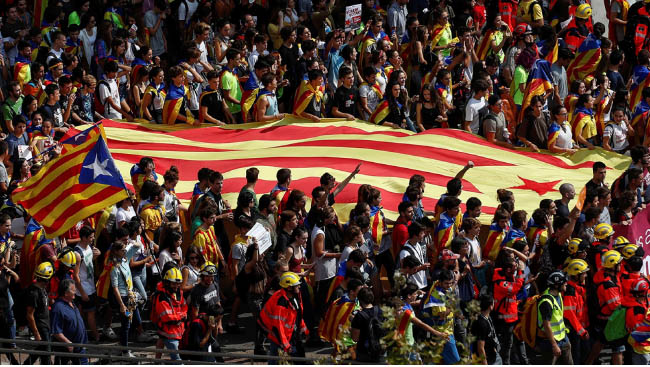Preamble:
Following the referendum held by Catalonia on October 01, 2017 to secede from Spain, two perspectives emerged in this regard: First, the referendum had no legal basis at all and it is illegal according to Constitution and Catalonia’s autonomous law. Second, referendum was in accordance with both the laws and it is legal based on the principle of “the right to self-determination”. This principle states that a nation, based on respect for the principle of equal rights and fair equality of opportunity, have the right to freely choose their sovereignty and international political status with no interference. Essentially, the right to self-determination is the right of a nation to determine its own destiny. In particular, the principle allows a nation to choose its own political status and to determine its own form of economic, cultural and social development.
History of Catalonia:
Catalonia is one of Spain’s richest and most highly industrialized regions, and also one of the most independent-minded. This county has roughly 7.5 million population and Barcelona is the capital. In fact, Barcelona is the second largest city of Spain. Barcelona was captured in 1714 by Philip V, which was a step towards the formation of the modern state of Spain. Catalonia is separated by the Pyrenean Mountains from southern France, with which it has close historical ties. When Spain became a republic in 1931, Catalonia was soon given broad autonomy. During the Spanish Civil War, Catalonia was a key Republican stronghold, and the fall of Barcelona to Gen Francisco Franco’s right-wing forces in 1939 marked the end of Spanish resistance to him. Under the rule of General Franco, even the use of Catalan language was banned in public places and its culture was suppressed. After the reestablishment of democracy in Spain, the state of Catalonia gained its autonomy within the country. It is worth saying that at present, the state has its own central government and functions somewhat independently of the central government of Spain, but taxes are controlled by and paid to central government. The Spanish government provides up to 20% of its net income from the Catalan income tax area. It comes as the autonomous county and Catalonia’s neighboring Basque does not divide its income with central government. However, this could also be considered as one of the main reasons for the independence and separation of Catalonia from Spain, it will not be discussed as a reason. There are pro and anti-Catalonia’s independence.
Reasons of Anti-Independence
Those who are against the Catalonia’s independence reason the Constitution of Spain. Spain’s Constitution states in article 2 as, “The Constitution is based on the indissoluble unity of the Spanish Nation, the common and indivisible homeland of all Spaniards; it recognizes and guarantees that right to self-government of the nationalities and regions of which it is composed and the solidarity among them all”.
Opinion of the Spanish Constitutional Court
In recent years, the Spanish Constitutional Court has opposed the Catalan Independence Referendum, symbolically though. The latest decision by the institution was issued about Catalan referendum law and suspended the referendum for five months. This law was passed on September 07, 2017 by a majority of 72 of 135 seats of the Independent Parliamentary Representatives of the Catalan Regional Parliament, which provided the ground for a referendum on October 01, 2017 with a one-sided “right to self-determination.” The court made this decision at the request of the government of Madrid, hours after its approval. Madrid government has argued that “lack of sovereignty for the people of Catalonia” was contrary to seven articles of the Constitution, including article 2 of the Spanish Constitution approved in 1978.
Self-determination includes the right of a people of an existing State to choose freely their own political system and to pursue their own economic, social, and cultural development. As such it does not, in light of the current state of international law, impose on all States the duty to introduce or maintain a democratic form of government, but essentially refers to the principle of sovereign equality of States and the prohibition of intervention which are already part of international law. In fact, the international law suggests that the right to self-determination refers to those countries under colonization or occupied by another country rather than a single state. There is another type of separation which is supposed to be done as a last resort to resolve the conflicts.
Conclusion
From the constitutional perspective, the verdict of Constitutional Court and the principle of accepting solidarity and multi-culturalism are one of the general principles of customary international law and the United Nations. Declaring independence has no rational justification; perhaps this has led the Catalans’ leader to postpone the independence of the state.
Home » Opinion » Catalan’s Independence Referendum from Legal Perspective
Catalan’s Independence Referendum from Legal Perspective
|

